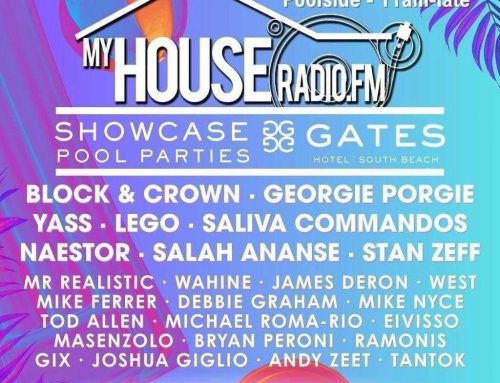
The London-based label Nice ‘N’ Ripe kickstarted one of the UK’s most celebrated sounds. On its 30th anniversary, NME speaks to the key players
One September evening in 1993, a 22-year-old Grant Nelson, his cousin Dave Thackaray, and his mate Si Firmin sat in a kebab shop basement amid cables and vinyls, experimenting with a new sound they’d heard from the States.
The product of their studio session was ‘Loosen Up’, the inaugural record on Nelson’s Nice ‘N’ Ripe label. Its title track was an infectious groove complete with rolling sax riffs, soulful vocal stabs, and a bouncy bassline emanant of MK. Then producing jungle and hardcore as Wishdokta, Nelson had had a revelation on hearing the Masters At Work Dub24 Hour Experience of Kathy Brown’s ‘You Can’t Play Around’ a week earlier. “It was just this weird jazzy thing with wicked beats and wicked basslines,” he remembers – and so he set out to make some.
With George Power of Crackers club, Kiss FM, and another of Nelson’s labels as its co-founder and financial backer, Nice ‘N’ Ripe was born. At the kitchen table in Nelson’s West Hampstead flat, his partner Kate came up with the name, and he drew the logo: a simple two-tone globe of the world, with the Nice ‘N’ Ripe name arching to fill it. “The next day I went back to George and said, ‘This is the label.’ He was like, ‘Brilliant. Start making the music.’”
In the four years that followed, Nice ‘N’ Ripe pressed over 300 releases across more than 40 sub-labels, including anthems like Industry Standard’s ‘What You Want’, and ‘Together’, under Nelson and Si Firmon’s alias, 24 Hour Experience. It took the sound of the soulful house garage coming out of the US by way of Frankie Knuckles and Todd Terry, and pioneered a distinctly UK sound drawing on British soundsystem culture, laden with skippy drums, chopped vocals, dubby baselines and melodic house piano.
Its releases populated the shelves of Ruff Trax on Wimbledon Broadway – the record store run by garage veteran Scott Garcia (of ‘It’s a London Thing’) – and inspired Mike Skinner’s ‘Original Pirate Material’ – NNR’s ‘Magic’ Mike Millrain would go on to produce The Streets’ third album ‘The Hardest Way To Make An Easy Living’.
But despite paving the way for what would become one of the most profitable and prolific mainstream sounds in the UK charts, lauded as one of the most influential imprints in the UK Garage scene, its rise was as fast as its fall.
Jeremy Sylvester first caught wind of Nice ‘N’ Ripe in the mid ‘90s, through Birmingham DJs Danny Technici and Adrian Hibbert (Spud). At the time, he was making jungle music as Dubtronix, but Nelson’s 4/4 sound stirred something in him. “It had that US flavour to it, but it sounded different. There were less vocals, it was more dubby and cut up, more skippy. It had a different edge to it that I loved.”
Initially, Sylvester had assumed Nice ‘N’ Ripe was American, a common and welcome misconception that Power and Nelson had intentionally engineered. “We tried to make it look like a US label,” Nelson explains, “because it was quite snobby at the time – people who were playing the American stuff wouldn’t really look at British stuff and vice versa.” For the purpose of credits, their basement recording studio became “The Cellar N.Y.” and the title track on ‘Loosen Up’ was suffixed by “NY Club Mix”.
Early record sleeves were deliberately elusive, with American-sounding pseudonyms replacing actual facts, but the inclusion of a UK phone number got Sylvester where he needed to go. “I rang ‘em up and found out they’re actually based in London,” he remembers. “So I sent them some of my stuff and they put it out.”
The day to day runnings of Nice ‘N’ Ripe were – much like the pirate radio stations responsible for its early fame – DIY. Its “office” was the spare room in George Power’s family home, with three desks squeezed into it. Its studio soon moved from the Rezet Grill basement into an industrial unit opposite; fittingly, considering the sound that would come out of it, “kind of like a garage”. Talent scouting was less of a traditional A&R process, and more, as Nelson puts it, “come down and make some tunes.”

Spending Wednesday nights at Paul Trouble Anderson’s notorious The Loft parties at Camden’s HQ, and Trouble’s House at Legends, Nelson networked enough to entice legends like Phil Asher, Dave Camacho and Colonel Abrams into the Nice ‘N’ Ripe recording studio. “I don’t think it gets talked about enough how influential and how important that club night was,” he says. “Everyone who was anyone would end up there – DJs, producers, vocalists, whatever. It was the social club of the US house fraternity in the UK.”
But despite the indisputable clout by association, Nelson was all but unaware of the scale of Nice ‘N’ Ripe’s growing traction. “I was on studio lockdown,” he says. “The only time I heard my records was in the car on pirate radio.” And one day in 1995, a celebratory comment from a distributor ultimately brought Nelson’s Nice ‘N’ Ripe journey to a jarring halt, revealing vast discrepancies between the numbers communicated with him, and actual sales. Sceptical about the label’s financial integrity, Nelson went digging, visiting multiple distributors around London and adding up units himself. What he found, he says, was a vast discrepancy.
When confronting Power, Nelson was met with a “cock and bull” story he found hard to swallow, that phoney accounting had been fabricated in order to ensure he received more profit from his collaborative 24 Hour Experience hits than Firmin. For Nelson, that explanation rang hollow. “‘scuse my French, but I basically just told him to go fuck himself. And that was it. Our partnership was terminated.”
By the time Jeremy Sylvester moved to London to join the label full-time, Nelson had already left Nice ‘N’ Ripe. He went on to found Swing City Records, and Power retaliated by launching Sting City. “Then I got angry and started Rise ‘N’ Shine. It was all very childish,” Nelson admits in retrospect. Sylvester, freshly employed, tried not to get involved. “I realised that there was a bit of a thing between them,” he explains, “but me and the other in-house producers just tried to mind our business.”
Though they didn’t overlap, Nelson and Sylvester share similar memories of their nicer (and riper) moments in Finsbury Park. “I was a studio troll,” laughs Nelson, whose pace of production – churning out sometimes two or three tracks in a single session – inspired the early aliases G.O.D. (Guaranteed Overnight Delivery) and 24 Hour Experience that Power would controversially redistribute to Sylvester and others after his departure. “I was a hermit,” says Sylvester. Both brought heavy bass to their sounds. “I was using the same floppy disc of samples from my old jungle records,” Sylvester explains. “The same 808 booms and synths, and mixing it all up on a 4/4 groove.”
Every Friday, Sylvester would visit Hackney’s JTS pressing plant with DJs Matt Jam Lamont and Karl Tuff Enuff Brown before they played at Twice As Nice or Cookies N Cream. “I’d bring a beer for Freddie Freshplate, and cut the tracks for them to play that night,” he remembers. “Then I’d be back at the studio on Monday tweaking the bass or the vocals based on what I’d heard in the club.”

Above all, it was the Nice ‘N’ Ripe days that cemented both producers’ legend status, and acted as a precursor for what would become known as UK Garage. As the genre gained its name towards the mid-late ‘90s, it was also gaining major traction, with its recipe of chopped R&B vocals combined with razor-sharp production increasingly attractive to major labels. “We were shifting between 12,000-15,000 units,” Sylvester says of his 1998 Club Asylum speed garage releases with Paul Emmanuel, which fused sped up 4-to-the-floor rhythms with breakbeats. “The major labels wanted official remixes for their commercial pop artists,” Nelson adds. His Bump & Flex remix of Indo’s ‘R U Sleeping’ would lead to official edits of Kelis, Mis-Teeq and James Brown, and fan the flames of the burgeoning 2-step rhythm that was spreading like wildfire off the back of speed garage.
“It’s hard now to imagine how exciting it was,” says Nelson, “but [2-step] sounded so fresh and different to anything that had come before. It felt so free. It was a brilliant time in British music history.” Though a hesitant 4/4 purist at first, Sylvester eventually also gave in to 2-step, resulting in Kristine Blond – ‘Love Shy’, and Shola Ama’s ‘Imagine’—two of the biggest edits in garage history.
Such remixes set the stage for UK Garage’s ‘It’ moment, galvanising artists like Craig David, Artful Dodger, MJ Cole, and So Solid Crew, who would catapult the genre to unprecedented popularity. But, as with many subcultures that brush with the mainstream, the garage scene began to unravel even as it soared. The very elements that made it vital and fresh—the tension between underground and commercial, the relentless quest for the new—also made it volatile.
The scene gained notoriety for the wrong reasons: sporadic arrests of its artists – particularly So Solid Crew members – meant the media, once enamoured, quickly soured, rashly pinning on garage music an array of societal ills it neither created nor sustained. “One minute UK Garage was the media’s darling, the next minute, they hated it because it meant trouble, drugs, and gangs. It wasn’t really like that,” says Nelson.
In their short (and tumultuous) tenures at the label, Nelson, Sylvester et. al. have left behind not just a sound, but an ethos of community and creativity that gathered around it, shaping UK Garage into something not borrowed, but unapologetically British. Three decades later, Nice ‘N’ Ripe embodies a golden age of UK Garage, the sweet spot between underground and mainstream, when possibility and innovation was still ripe for the picking. “They say the biggest stars burn fast and bright,” says Nelson. “And I think it was a bit like that.”





Leave A Comment
You must be logged in to post a comment.